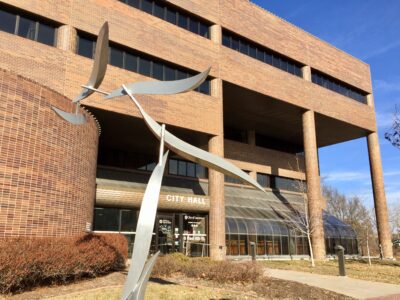Upcoming KU talks to examine how communities, campuses respond to emergencies

photo by: Sara Shepherd
KU Office of Public Safety patrol vehicle, pictured June 2016
It could happen anywhere.
In coverage of the Florida high school shooting that left 17 dead earlier this month, that phrase, emphasizing the ubiquity of school shootings, has appeared again and again. This spring, the University of Kansas will host a series of talks examining how college campuses respond when disaster strikes, encompassing everything from floods and power outages to bomb threats and active shooters.
The lecture series, hosted by the KU Public Safety Office’s Emergency Management, kicks off Tuesday with a presentation by Katie Treadwell, associate director of KU’s Office of First-Year Experience.
Treadwell’s presentation will draw from her own research exploring how leaders in higher education guided their campuses through high-profile disasters and how universities can plan for and respond to crises. The following talks, in March and April, will similarly focus on “the academic side” of emergency management, said Carrie Summers, a specialist at KU’s Public Safety Office.
“Our intention in the emergency management department here at KU is just to make sure we reach out to our students, faculty and staff and really try to engage them in emergency preparedness,” Summers said, “and try to get our brains thinking, too, about how we would recover from an event if something were to happen here.”
Although KU hasn’t had a mass shooting on the level of Virginia Tech or the 1966 University of Texas massacre, it has dealt with less-deadly emergencies, or “incidents,” over the years, said Andrew Foster, KU’s emergency management coordinator.
Those in Foster’s field have a “pretty broad” concept of emergency and disaster, he said, though it usually boils down to “anything that really disrupts the normal operations of an organization,” including everything from chemical spills to hostage situations.
“It’s as simple as, if we lose a water line up here (on campus), how does this disrupt our community?” Foster said. “We have to plan for the smallest thing to the biggest thing.”
The series’ first talk, from 12:30 to 1:30 p.m. Tuesday, will address long-term strategies for emergency and disaster recovery. The other two, scheduled for the same time March 29 and April 27, will cover crisis mitigation and the varied cultural perceptions of high-profile disasters, respectively.
All three lectures will be in the Crossroads Room on the fourth floor of the Kansas Union, 1301 Jayhawk Blvd. KU Public Safety staff will also be distributing literature on preparedness for visitors. And, though the event is geared toward KU students and staff, all are welcome.
“This is for all of Lawrence, because we don’t operate in a vacuum,” Foster said.
“We’re really concerned with that long-term recovery strategy of, how we do ensure that what we’re doing is for the best for the university for the next five years, 10 years, 15 years?” he said.



